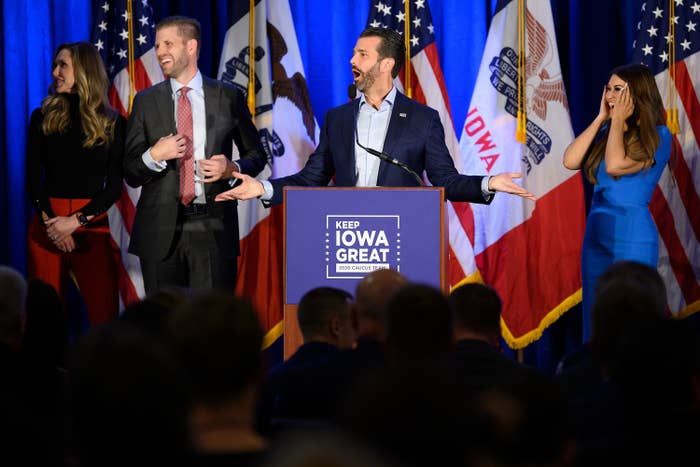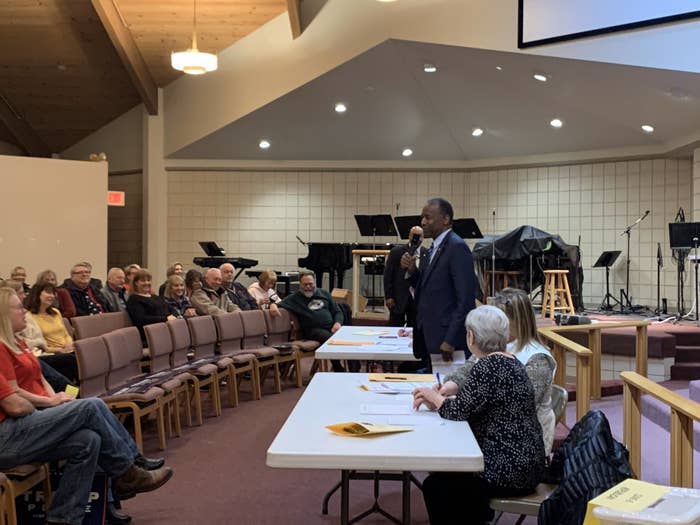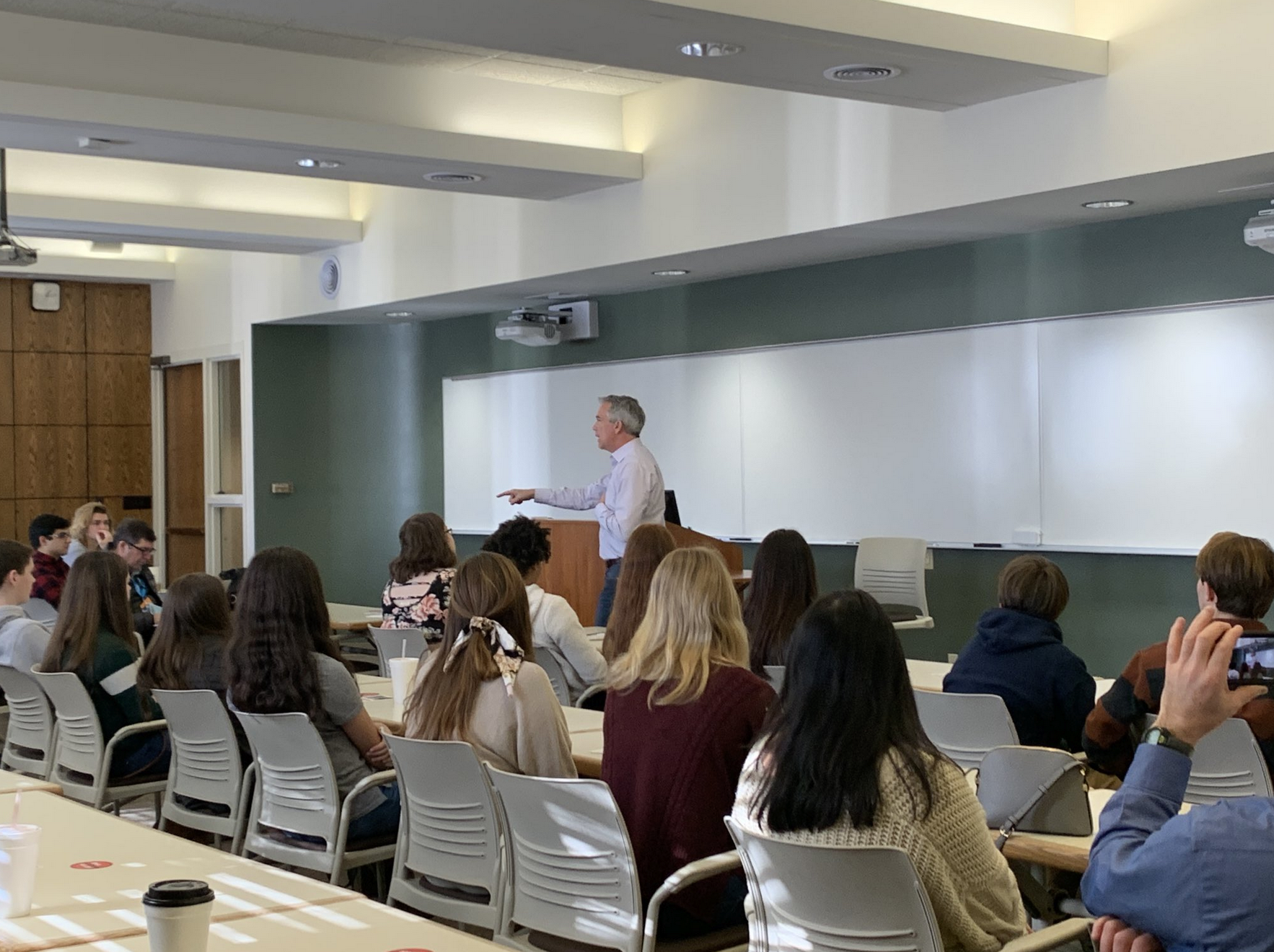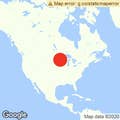
WEST DES MOINES, Iowa — As chaos continued around the Democratic caucuses this week, something almost as weird was happening at the same time in Iowa: Dozens and dozens of Trump cabinet members, relatives, and supporters showed up in Des Moines.
First there was a big Trump rally, and then a press conference involving a host of Trump surrogates; then, dozens of those surrogates fanned out across the state to speak to Republican caucusgoers — because Trump is technically facing two primary challenges, and Republican caucuses were being held.
The campaign’s decision to flaunt its dominance in Iowa, a safe red state where Trump did not face a serious challenge in the caucuses nor will he in the general election, is a highly unusual move for an incumbent president’s operation. The strategy seems to be less about literal winning than, as is often the case in Trump world, the energy and appearance of winning; by camping out in Iowa, the campaign was able to attract extra media attention in a week that normally would have been commanded by Democratic politics and reemphasize the president’s dominance of his own party.
“We are at the starting line,” Brad Parscale, Trump’s campaign manager, told a caucus watch party the Trump campaign assembled in West Des Moines.
“Tonight President Trump posted a record performance in the well-run GOP Iowa caucuses with record turnout for an incumbent,” he said in a statement released later that night, actually touting Trump’s victory over former Massachusetts governor Bill Weld and former Illinois representative Joe Walsh, his two rivals for the nomination, both of whom are running skeletal protest campaigns.
But of course Trump won. At caucuses attended by his surrogates, it was clear how deeply bonded his supporters are to him.
At the Community Heights Alliance Church in Newton, a couple hundred people sat in the pews to listen to Kimberly Guilfoyle, a senior campaign adviser, national finance chair, and girlfriend of the president’s son Don Jr., make the case for Trump. “We have 80 of our best and brightest all across Iowa,” she said before reading a letter from Trump. “It starts, ‘Iowa...’ — unlike Joe Biden, he knows where we are.”
Guilfoyle credited Trump with economic successes and said he had “economically emancipated” American women. She framed the impeachment trial as a way for Democrats to “steal votes” from those who voted for Trump. “Sometimes I like to call him the honey badger, because no matter how much they come after him, he stands tall and proud.” Members of the crowd — several in MAGA hats — waved “Veterans for Trump” signs and applauded liberally. Neither the Welsh nor Weld campaigns sent surrogates.
Paulette Simons, 69, a retired receptionist, said she decided to attend the caucus, even though its results were a foregone conclusion, because “I want him to stay president.” She said Trump’s support for anti-abortion policies, religious freedom, and school choice drove her.
Ben Carson, secretary of housing and urban development, a popular figure among the evangelical Christian voters who comprise an important bloc of Iowa’s Republican electorate, also turned out for Trump at a Lutheran church in Clive, a suburb of Des Moines.
The assembled voters were clearly thrilled to see him, giving him a standing ovation on his way in and out. One man, Bob Underberg, 77, was wearing a Ben Carson 2016 campaign T-shirt. Underberg and his wife, Doralyn, 74, said they came out that night because Carson would be there, but they were going to caucus for Trump, “of course.” (“That’s a silly question,” Doralyn said.)

Carson started by telling the voters that Trump often asks him, “'Ben, aren’t you glad that you didn’t win?' I have to admit, the answer to that is yes — because the way the poor man is treated 24/7, just criticism of everything,” he said. The entire room laughed, the warmth toward him palpable.
Holding a piece of paper, he made a pitch for Trump’s reelection in his signature soft-spoken style: touting Trump’s first-term achievements, bashing the media, and warning against the Democrats’ “socialism.”
“We're talking about socialism versus the system that made America the greatest nation in the world,” he said. “And this is what this the election is fundamentally about.” He hustled out right after speaking.
After Carson left, the caucus chair introduced Walsh’s representative, campaign official Ann Herberger, pronouncing her name “Hergerberger.” Herberger received a round of polite, if subdued, applause. She was careful to tell the voters that Walsh's campaign respected the voters and the process, and it would respect the result. The pitch was undeniably lukewarm and seemed carefully calibrated to separate Walsh from other “never Trump” Republicans who are harsher toward the president.
“Just because we tend to disagree on who the candidate is doesn’t mean we don’t love our country and that we don’t love democracy and that I don’t love being a Republican,” Herberger said. “Doesn’t matter if we disagree or if we agree wholeheartedly, it takes Republicans to get things done.”
“I’m not a Republican who didn’t believe that Donald Trump got duly elected,” Herberger said. “Absolutely he did. The people spoke, he is our president, and I respect him. ... My hope is you will consider Congressman Walsh, and whatever the outcome is tonight, we will respect that.”
No one in the room seemed at all enthusiastic about or even aware of the other Republicans running. But, actually, they’ve been campaigning — or, they did, a little, kind of.
Weld, who announced his bid against Trump for the Republican nomination last April, arrived in Iowa on Saturday, two days before the caucuses. He stopped for dinner at Centro and ran into his old friends John Kerry and Chris Dodd, who were there to campaign for their old friend Joe Biden.
Weld’s pitch, constructed around his identity as a centrist moderate, is seriously out of step with today’s Republican Party.
And despite running for the Republican nomination, Weld would be happy to vote for a Democrat — if the nominee were someone like Mike Bloomberg or Joe Biden. He told BuzzFeed News he was “delighted” Bloomberg had entered the race — “I tried to persuade him last year to run as a Republican. He didn’t want to do that," Weld said. "At that point, he was thinking about running as an independent.” He said he would “be happy with any of the centrist Democrats” and would vote for Biden, whom he’s also “known for a couple of decades,” in a “heartbeat.”
The next day, as Kerry was caught in the lobby of the Renaissance Des Moines Savery Hotel musing about whether he would be “fucking deluded” to get into the Democratic race himself, Weld stopped by a few coffee shops in Des Moines to meet the patrons. Before going inside the Raygun store in the city's hip East Village, Weld gaggled with a handful of reporters near a few curious onlookers. Inside the store, Weld ambled around, peering at the T-shirts on the racks. He chose a red “Mahomes for President” T-shirt, a reference to Kansas City Chiefs quarterback Patrick Mahomes. “Buy something for your wife,” one of his aides urged. (He chose a T-shirt about “Midwestern Zodiac Signs.”)
Nearby, Tony Cupp, 36, from Des Moines, stood wearing a Weld T-shirt. He’s supporting Weld because he “wanted an alternative to President Trump without crossing over." He added, "I think the governor is an outstanding alternative.” He said he would go out to caucus for Weld; he and his wife, Laura Cupp, 33, said they expected it to be pretty small.
“I think a lot of people don’t even realize that there is a Republican caucus. I expect it to be a room with party officials and myself and my wife and not much else,” Cupp said.
Hours later, Weld’s (and Trump’s) rival Walsh — a former member of Congress from Illinois who was elected during the tea party wave of 2010 and later gained further notoriety as an unconstrained, and sometimes racist, online right-wing personality — was holding a campaign event about 30 minutes away. Walsh’s pitch has been different from Weld’s, focusing on portraying himself as the true conservative alternative to Trump.
Walsh was speaking at Simpson College in Indianola in a classroom filled with students.

It turned out that the students were mostly high schoolers from Massachusetts there on a school trip to check out the Iowa caucuses, and thus ineligible to support Walsh in any electorally meaningful way.
After warning the audience that he had a migraine, Walsh took questions for nearly an hour, his delivery impassioned and sometimes shouted. Walsh insisted on high-fiving nearly every questioner (“I’m an idiotically crazy high-fiver”), most of whom were the high school students.
Walsh told BuzzFeed News he thought the Trump campaign’s decision to make a show of force around the caucuses “means they’re afraid of turnout.”
“The party in this state has given us their middle finger,” Walsh said. (Iowa GOP Chair Jeff Kaufmann couldn’t come up with Walsh’s last name in an interview with New York magazine’s Olivia Nuzzi last week, calling him “that Joe fella.”)
“I’ve been here for months,” he said. “I’m the only Republican campaigning here. Bill Weld’s come in a couple of times. We’ve had to create our own organization. We have people on our team who have worked in the Iowa caucuses before. We have a huge list of potential caucusgoers we’ve been working with on the phone.”
Weld also complained about his treatment by the state party, saying, “We’ve had no intersection with the Iowa GOP because they’re the Trump organization.” But he said his strategy didn’t hinge on relationships with the state party structure, instead focusing on “increasing the number of voters voting in the Republican primary.” He said the turnout of young voters had been “impressive” in his stops at coffee shops earlier that day.
But at least Iowa held a Republican caucus; several other states’ Republican Party organizations aren’t even going to hold primaries or caucuses, refusing to countenance possible (if unlikely) threats to Trump’s incumbency. And even in states where the contests will go ahead, it’s clear that it’s merely a formality. Weld told BuzzFeed News that even in his home state of Massachusetts, the state party is “dead set against me.”
In the end, the whole thing seemed more like an exercise for Trump supporters to make fun of the Democrats, even from their random perch in Iowa.
As news of the results' delay began to spread on Monday night, Corey Lewandowski, a member of Trump’s reelection team, was asked what he thought as he exited a caucus watch party. He flashed a smile and shouted: “Typical!”


